|
|
|
Sort Order |
|
|
|
Items / Page
|
|
|
|
|
|
|
| Srl | Item |
| 1 |
ID:
120517
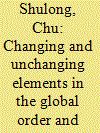

|
|
|
| 2 |
ID:
139174


|
|
|
|
|
| Summary/Abstract |
The use of the term Naxalism has become synonymous with Maoist activities in India. All such activities are branded as Left Wing Extremism (LWE). The Maoist movement calls for a complete transformation of the political, social and economic systems as existing in India. In its essence, it challenges the validity of the Indian Constitution and rejects the Parliamentary system, seeking to replace it with a new social order. It draws its strength from existing weaknesses in society where certain vulnerable sections have been marginalised and exploited and, thus, can be penetrated and swayed by Maoist ideologues, who promise the people a fulfillment of their aspirations and a life of dignity and self-respect. The Naxal movement has a relationship to Communism. Karl Marx propounded that in order to fight feudalism and capitalism, “You must have a scientific philosophy and a sound theory, for a workers movement to be built up on a scientific basis”. In dealing with the problem of social change, Marx examined two concepts, the first dealing with the “forces of production” and the second with the “relations of production”. He was more interested in examining the military concepts of the social revolutionaries, which earlier lay in the domain of great political leaders, legislators and pioneering reformers. According to Marx, the social process would lead to revolution at a certain stage of development and the material productive forces of society would come into conflict with the existing relations of production. He emphasised that change could be
brought out only by revolution and not by peaceful means.1 The Naxal ideology flows from this line of thought.
|
|
|
|
|
|
|
|
|
|
|
|
|
|
|
|
| 3 |
ID:
048419
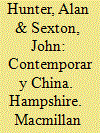

|
|
|
|
|
| Publication |
Hampshire, macmillan Press, 1999.
|
| Description |
xiii, 226p.hbk
|
| Standard Number |
0312221460
|
|
|
|
|
|
|
|
|
|
|
|
Copies: C:1/I:0,R:0,Q:0
Circulation
| Accession# | Call# | Current Location | Status | Policy | Location |
| 041389 | 951.059/HUN 041389 | Main | On Shelf | General | |
|
|
|
|
| 4 |
ID:
132795
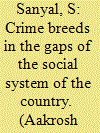

|
|
|
|
|
| Publication |
2014.
|
| Summary/Abstract |
A social system of a country is the baseline and the centre of growth and it acts as a mirror to the development of the nation and its people as a whole. When feelings of unrest, dissatisfaction and being ignored spread from one individual to more people in the same situation. they gradually transgress to bigger groups. having a ripple effect on a particular section of the society. Finally, they emerge into a larger unrest and turbulence, not only bringing in a divide between different regions, slates and communities, but also disrupting the total harmony of the country. Inequality is the main cause of this disharmony, and it can spiral-head from many sources. The simmering uneasiness, if not contained or controlled by the government. explodes into all forms of social turbulence. ranging from class and caste fight to communal riots and internal turbulence. fostering insurgency and a separatist attitude among the people in the country. Regional divide further promotes polarization of a particular section of the society, which then fights for a separate statehood. These are the consequences of an unequal distribution of growth wealth and prosperity. Thereafter, these gaps, differences and inequality are factors which contribute to social dysfuction and become a vital cause of crimes of any pattern
|
|
|
|
|
|
|
|
|
|
|
|
|
|
|
|
| 5 |
ID:
099583
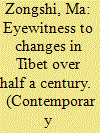

|
|
|
| 6 |
ID:
153655
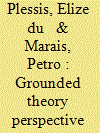

|
|
|
|
|
| Summary/Abstract |
The methodology of grounded theory has great potential to contribute to our understanding of leadership within particular substantive contexts. Leadership is a global phenomenon, but appears to have a variety of attributes and seems to elude clear definition. In this research we argue that such variation is contextually derived. Leadership is not only a socially influenced process but also a relation-influenced process that occurs within a social system. The focus in this paper is on the challenges facing leaders engaged in multicultural education. In general, grounded theorists seek to develop theory inductively from systematically gathered and analysed data. An integrative picture or story is developed from this process. In the present instance we explore how conducting grounded theory research according to a qualitative approach accentuates the need to understand and explain contextualised leadership. We conclude by suggesting how leaders might overcome challenges in multicultural education.
|
|
|
|
|
|
|
|
|
|
|
|
|
|
|
|
| 7 |
ID:
124511


|
|
|
|
|
| Publication |
2013.
|
| Summary/Abstract |
This article aims to disrupt the silence, invisibility and erasures of non-heteronormative sexual orientations or gender identities, and of sex work, in HIV/AIDS responses within displacement and post-conflict settings in Africa. Informed by Gayle Rubin's sexual hierarchy theoretical framework,1 it explores the role of discrimination and violation of the rights of sex workers and of gender and sexual minorities in driving the HIV/AIDS epidemic during displacement. Specific case materials focus on ethnographic research conducted in urban and rural Uganda. Recommendations for policy, practice and programmes are outlined.
|
|
|
|
|
|
|
|
|
|
|
|
|
|
|
|
| 8 |
ID:
133073


|
|
|
|
|
| Publication |
2014.
|
| Summary/Abstract |
The origins of this article lie in a new study of the Nazi German economy by Adam Tooze, a fragment of which argues that the need to overcome the technological deficit built by the Western Allies in antisubmarine warfare from 1939 triggered a major shift in U-boat design and production after 1943.1 Tooze points out that an emphasis on technological solutions to strategic and operational problems had by that point become a hallmark of the Nazis', and especially Hitler's, thinking. (Other examples were the Tiger and Panther tanks at Kursk, both of which types proved dysfunctional as platforms, and neither of which proved decisive to the outcome.) So interpreted, the Nazi penchant for imputing to innovation the means to solve a whole class of operational and strategic problems seems to resemble "technological fixes" in other fields of innovation.2 In so arguing Tooze writes off the findings of Richard Overy, who points to the failure of the regime to develop positive relationships between industry and the war effort as reflecting a "peculiar irrationality of the 'Nazi social system.'" Tooze highlights the research of Ralf Schabel on jet-engine development in the aircraft industry, research asserting that exaggerated technological expectations resulted from Germany's hopeless strategic dilemma and that the systems themselves, while quite promising, were rushed into mass production and combat without adequate testing or development. Interestingly, he then characterizes Admiral Karl Dönitz's decision to embrace the Type XXI submarine in 1943, under the technocratic direction of Albert Speer's ministry, as reflecting both the increasing unreality of German armaments propaganda and a progressively more authoritarian cast of the German war economy.
|
|
|
|
|
|
|
|
|
|
|
|
|
|
|
|
| 9 |
ID:
168411
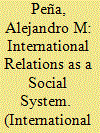

|
|
|
|
|
| Summary/Abstract |
Against current developments in the sociology of IR, from new systemic theorizations of world society to Bourdieusian approaches to the practices of IR scholars, this article claims that relevant problems remain regarding how IR theorizes its social location and reconciles the social character of the world it observes with the social character of its observations. To reformulate these problems, the article draws from an underused paradigm of social system theorizing, sociocybernetics, offering a radical constructivist treatment of the problem of observation and reflexivity. Elaborating the notion of second-order cybernetics and Niklas Luhmann's take on the reproduction of observing social systems, the article argues that IR can be conceived as an observing social system that adapts by altering and subdividing the semantic boundaries of its systemic communications, that is, IR theories. This socio-heuristic process structures both the first-order observations IR makes about the world, as well as second-order observations of itself. In this manner, the article argues that sociocybernetics-informed sociology of IR communications can contribute to a more nuanced understanding of IR as a social system that observes society from society.
|
|
|
|
|
|
|
|
|
|
|
|
|
|
|
|
| 10 |
ID:
131902
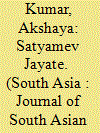

|
|
|
|
|
| Publication |
2014.
|
| Summary/Abstract |
Avatar
Film Star
Political Surplus
Truth
Entertainment
News
Crime
Cultural Economy
Moral Authority
Political Authority
Aamir Khan
Narrative Ingenuity
Politics
Social Changes
Trope
Social System
Social Reforms
|
|
|
|
|
|
|
|
|
|
|
|
|
|
|
|
| 11 |
ID:
044160
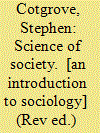

|
|
|
|
|
| Edition |
Rev ed.
|
| Publication |
London, George Allen & Unwin, 1967.
|
| Description |
310p.
|
| Standard Number |
0043000384
|
|
|
|
|
|
|
|
|
|
|
|
Copies: C:1/I:0,R:0,Q:0
Circulation
| Accession# | Call# | Current Location | Status | Policy | Location |
| 011060 | 301/COT 011060 | Main | On Shelf | General | |
|
|
|
|
| 12 |
ID:
121615
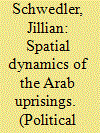

|
|
|
|
|
| Publication |
2013.
|
| Summary/Abstract |
Analyses of the spread of the Arab uprisings have been dominated by three comparative angles. Single-country studies have emerged as the most common framework, often put to use in a second comparative approach of examining variation across cases. For example, studies explore which states have had major uprisings and which have not, which uprisings were peaceful and which were violent, and so on (Amar and Prashad 2013; Haddad, Bsheer, and Abu-Rish 2012; McMurray and Ufheil-Somers 2013; Sowers and Toensing 2013). A third approach explores comparisons with other waves of popular mobilization against authoritarian regimes, for example, in Europe during the mid-nineteenth century, Eastern Europe following the collapse of the Soviet Union in 1989, and so on (Patel, Bunce, and Wolchik 2013 Weyland 2012). These literatures investigate the complex processes of mobilization, revolution, and transition unfolding in parts of the Middle East since the outbreak of the uprisings in late 2010. From the literature on revolutions, for example, we know that a popularly based movement that brings about some change in political leadership does not necessarily lead to a regime change resulting in a fundamental overturning of an economic, political, or social system. From past cases we have learned that at least some old institutions and alliances almost always reemerge, and what form the new institution will take eventually is often unknown for several years-for example, think of the Iranian revolution, let alone the French revolution. As events in postrevolutionary Tunisia, Libya, Egypt, and Yemen continue to unfold-and it is questionable whether those revolutions are even over-and as the bloody civil war in Syria continues, these insights provide us with useful tools for examining how institutions, processes, and power relations are changing-and how they are not.
|
|
|
|
|
|
|
|
|
|
|
|
|
|
|
|
| 13 |
ID:
124979
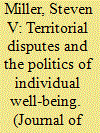

|
|
|
|
|
| Publication |
2013.
|
| Summary/Abstract |
Multiple studies argue that the division of territory between states is a root cause of war in the international system. This is often understood as a function of the unique importance of territory at the level of the individual citizen, because the territory itself directly affects an individual's well-being on multiple dimensions. As such, disputes over territory should also have consequences for an individual's overall subjective appraisal of their well-being. This article argues that disputes over the allocation of territory between states do affect an individual's subjective well-being, but not uniformly. Citizens in states routinely targeted by a territorial threat from a revisionist neighbor are generally unhappy. However, citizens in states that initiate territorial disputes are happier as a result of the aggressive foreign policy of the state leader to secure the coveted territorial good. This is first demonstrated using mixed effects modeling on data drawn from the World Values Survey and Correlates of War Militarized Interstate Dispute dataset. In addition, this article provides an illustration of variations in territorial threat and subjective well-being using the case of Nigeria, finding that Nigerians were happier when their state was initiating territorial threat against its neighbors and less happy during a period when Nigeria itself was the target of territorial threat. The analyses provided advance the territorial conflict research program by measuring the individual-level effects of territorial disputes. In addition, the findings add to a growing scholarship on the political determinants of an individual quality of life, sometimes considered the 'ultimate dependent variable' in social science.
|
|
|
|
|
|
|
|
|
|
|
|
|
|
|
|
| 14 |
ID:
027861
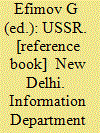

|
|
|
|
|
| Publication |
New Delhi, information department of the USSR embassy in India, 1957.
|
| Description |
v, 328p.Pbk
|
|
|
|
|
|
|
|
|
|
|
|
Copies: C:1/I:0,R:0,Q:0
Circulation
| Accession# | Call# | Current Location | Status | Policy | Location |
| 012291 | 947/EFI 012291 | Main | On Shelf | General | |
|
|
|
|
|
|
|
|
|